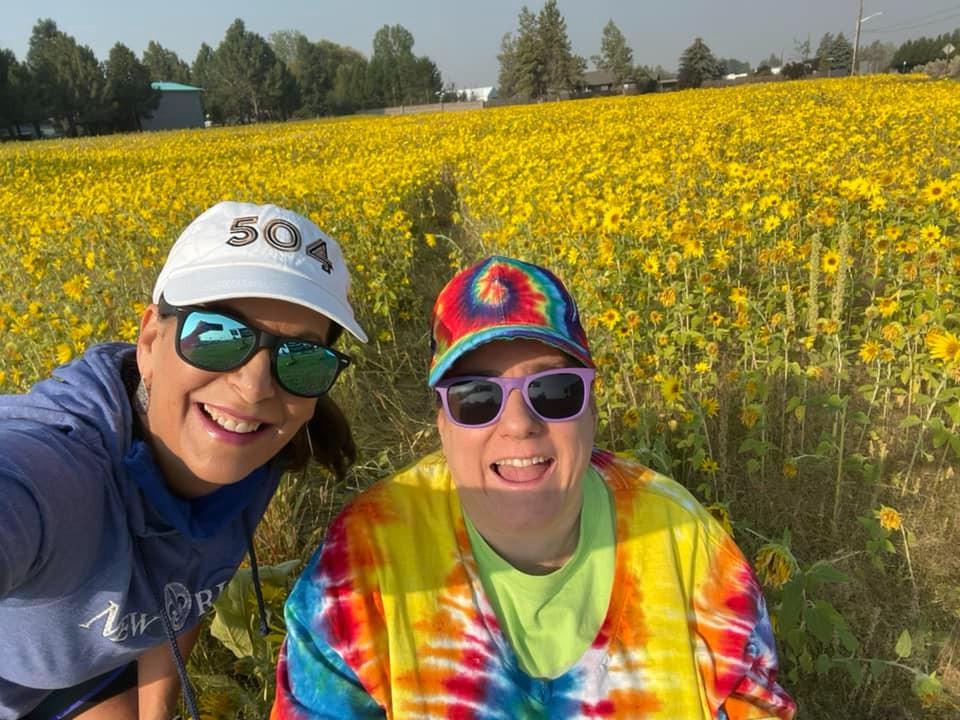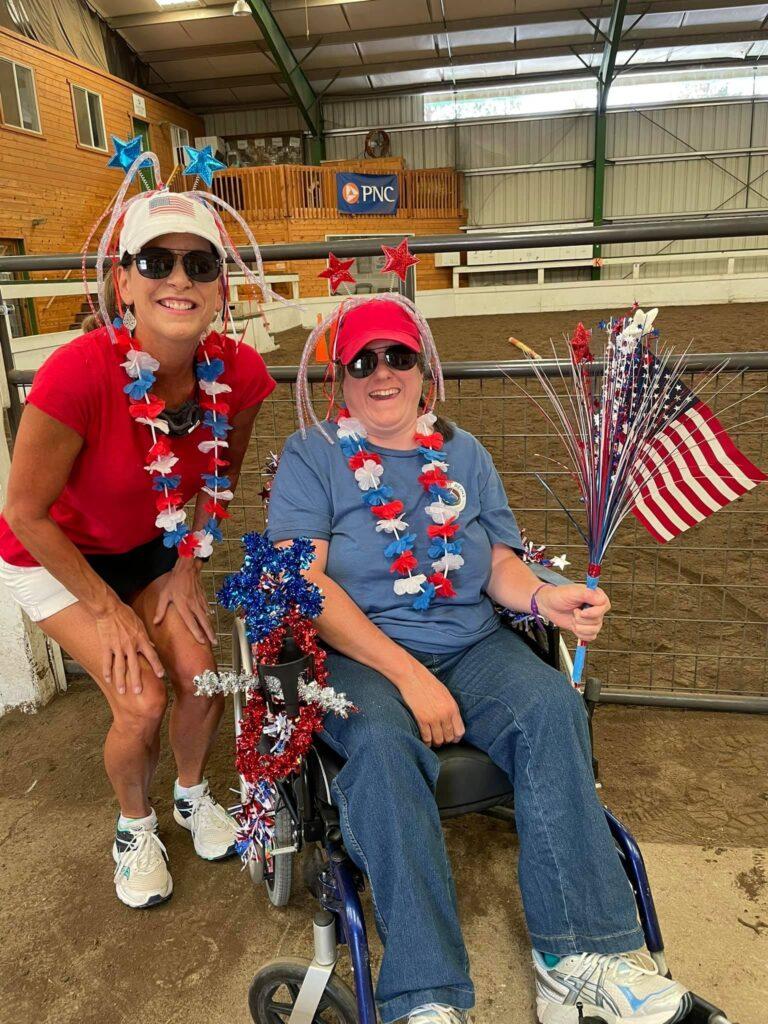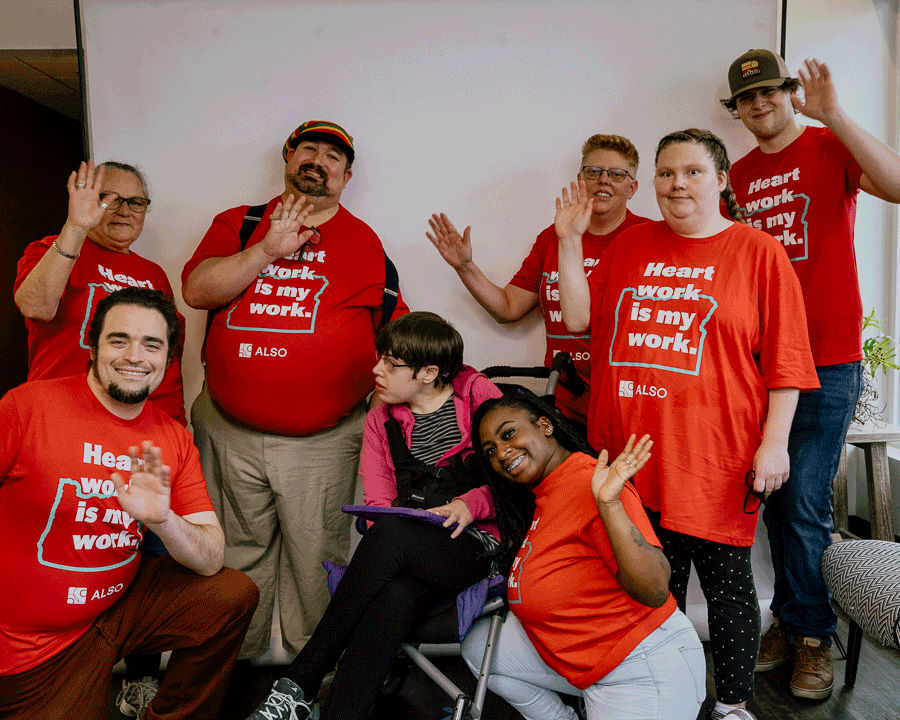Explore the ALSO Children’s Homes Wishlist and help fill the season with joy for the children supported by ALSO.
Explore the ALSO Children’s Homes Wishlist and help fill the season with joy for the children supported by ALSO.

One thing that all humans have in common is that we treasure our leisure time, where we can mosey along our favorite nature trail, go bowling with our pals, or create something beautiful at the local ceramics shop. Such activities are critical to our physical, mental, and emotional well-being. In fact, it’s very healthy to include some level of fun in our everyday activities.
ALSO is an Oregon support service provider for people with intellectual and developmental disabilities. Below, we explain the importance of accessible recreation and how to improve opportunities for people of all ability levels.
Accessible recreation can be described as sports, recreation, and leisure activities that are established in ways to ensure that people of varying ability levels can enjoy them. Here are some examples of accessible recreation:
The Americans with Disabilities Act (ADA) clearly recognizes the importance of accessible recreation for people with disabilities and has played a major role in establishing equal access to public parks and outdoor recreation areas. The ADA and the advocates who helped craft it had a clear understanding that recreational inclusion is a major factor in full community integration.

Accessible recreation offers numerous benefits for people with disabilities. It’s no surprise that the same benefits can be gained by those of us without disabilities!
Regular physical activity is the cornerstone of good physical health and management of chronic conditions. Some disabilities have a greater risk of cardiac complications, such as those with Down’s Syndrome, making physical exercise even more important. Physical activity also improves motor skills, coordination, and can even be related to better cognitive function.
We all know how good it feels to go to the batting cage after a bad day at work or school. Recreation is a great way to manage stress and relieve anxiety. Individuals with mental impairments benefit particularly from having easy access to recreational and social activities.
The chance to improve skills in a particular sport or artistic endeavor tends to lift self-confidence and self-esteem. Empowerment helps individuals to appreciate their own unique differences.

Tough question? Well, not really. The best recreational activities are those that satisfy an individual’s unique needs, goals, and desires. Here are a few examples.
Group sports are great for practicing good sportsmanship and being a team player. Some examples are baseball (or T-ball), soccer, or golf.
Various outdoor activities are great for creating adaptations for people of different ability levels. Nature trails both close to city centers and in the mountains are often clearly designated as far as difficulty. Let’s not forget the activities available in our own backyards, such as gardening, photography, or caring for our pets.
Artistic pursuits such as painting and drawing show us ‘what lies beneath.’ Creative activities provide an outlet for our emotions and feelings. Other creative pursuits such as music therapy have been shown in previous research to demonstrate benefits in mental health, cognitive abilities, preventing social isolation, and stress reduction.
Social activities can be get-togethers where friends, co-workers, and neighbors get together and chat. People can also gather for a specific purpose, such as:
One of the best recreational groups in Oregon is Adaptive Sports Northwest (ASNW). ASNW “exists, not only to provide adaptive sports and recreation opportunities to those in Oregon & SW Washington, but to tap the potential of possibility in each individual who participates with them.” We had the great opportunity to interview Jen Armbruster, the Executive Director of ASNW, to hear a unique perspective on accessible recreation and to learn a little bit more about what they do as an organization. Check out this impactful interview below:
1. What is Adaptive Sports NW (ASNW)?
“ASNW has been around since 1982. The primary focus of our nonprofit is to bring recreational and competitive opportunities to youth and adults with physical & visual disabilities.”
2. What role do you play in ALSO’s connection with ASNW?
“I’m the Executive Director of ASNW and my better half is a Manager II in the supportive living department and has been with ALSO before I was ED. I had volunteered and helped where I could at ALSO including helping to organize recreational activities for folks. We were looking for a new office and it just made sense to connect with ALSO and be so close to the East Portland CC as well. So again everything just fell into place and I hope ALSO enjoys having us around and finds that we are good community partners.”
3. What kinds of activities does ASNW offer?
“ASNW is a nonprofit that offers a wide variety of recreational activities to people of all abilities. Their Adaptive Cycling Program is huge and a very popular choice that is available to everyone. It features an entire track where people can bring their own bikes or we have adaptive bikes to offer for all folks to be able to ride with their families or friends. Additionally, ASNW offers sitting volleyball, track and field, and pickleball.”
4. What are the Benefits of ASNW?
“The benefits are not only the physical benefits from exercise and physical activity, but the social and emotional benefits as well. We want to build community and have folks feel comfortable with sports and recreation no matter their ability.”
5. How Does ALSO Support ASNW? Or what is the connection between ALSO and ASNW?
“The first obvious one is that ASNW rents from ALSO and has an office at the SE Cherry Blossom location. We are both nonprofits that want to make sure folks with disabilities live, work and play in their communities. We really focus on the play part of course. Also, many of our sports/recreational offerings are open and inclusive to all. We share resources and ideas and try and help by volunteering for each other’s organizations and sharing the mission of one another.
Our prime focus is on sports/recreation with individuals with physical and visual disabilities and ALSO’s prime focus is on living/working and individuals with intellectual & developmental disabilities. Often, I believe folks look at these populations in a silo and they are not. Disability is not mutually exclusive. At the end of the day both ASNW & ALSO want to provide avenues for folks with disabilities to live, work and play in their communities and meet folks where they are at and introduce them to a variety of ways to engage. Additionally, we often share resources and refer people in both directions.”
6. How Do You Get Involved with ASNW?
“I think the first step for folks to be involved is to check out who we are and what we do on our website. We offer 10 different sports & recreational activities. Some are competitive, some are recreational some are open to everyone to try. We specialize in adaptive and para sports for sure, but many of our activities are open to family, friends and everyone to participate together.”
Although there’s been an increased effort in establishing greater accessibility to sports and recreation, we can do even better. At ALSO, we advocate for equal access to sports and recreation activities throughout communities. In addition, we assist the people we support by encouraging self-advocacy.
Certain environmental factors in a specific recreation center may be interfering with equal access, and providers may be unaware of the problem. For example, although there may be a wheelchair ramp at a building entryway, during snowy weather, the ramp may be too difficult to navigate.
Recreation providers may also benefit from consultations and learning sessions on accessibility and/or reasonable accommodation from DSPs, occupational therapists, and other healthcare professionals.
Initiatives for improved accessibility in sports and recreational activities could begin virtually anywhere in the community, including and not limited to:
These grassroots efforts can be extremely successful as well as empowering for disability advocates and self-advocates, families, policymakers, and community members.

We had the chance to interview two wonderful women on the impact of accessible recreation in their lives. Read below to find out more about their special story.
Interview with Annie:
1. How would you define accessible recreation?
“I would define accessible recreation as an activity that has the information, support, equipment, and adaptations/ modifications that make it possible to participate.”
2. How does accessible recreation impact people with disabilities in your opinion?
“Having recreation that is accessible has a huge impact on any person’s lifestyle. For a person with a disability, it can mean the difference in their overall physical, mental, and emotional health. Participating in community recreation can open the opportunity to form friendships, empower the participant, build muscle strength/coordination/balance, and the feeling that they are fully included in their community.”
3. How does accessible recreation play a role in your life?
“In my own personal life, having accessible recreation available to me is a reason I enjoy living in Oregon. I am an avid hiker year round, and having all the beautiful trails that are nearby is such a plus. Before I can access any of them, I know I need transportation, the right equipment (shoes, backpack, trail guides/apps, and other essentials), and sometimes a hiking buddy for support and safety. I also enjoy paddle boarding on our beautiful lakes and rivers.”
“While access is quite easy for me, this isn’t the case for many others, especially those with a disability. When I started working with Janai, I wanted her to have the same opportunities to explore options and develop her own interests. We tapped into resources in her community and found wonderful support to make it happen. Janai now has several new accessible activities that she enjoys, and also her favorites.”
4. How did you meet Janai? How long have you known each other?
“I met Janai through Lori at ALSO. As a retired Special Education teacher, I wanted to find a way to utilize my skills in a different way out in the community. Lori thought Janai and I would make a great match, and she was absolutely right. However, I knew nothing about available resources for adults with disabilities. Janai and I explored options and resources together and learned what was available. We have now known each other for six years, through two towns, and several home moves on Janai’s end. I totally love my “job” that never feels like work.”
5. What kinds of activities do you and Janai participate in together?
“Janai and I are always looking for new and exciting “adventures.” When I met Janai she was primarily using a manual wheelchair and had very limited mobility. She spent the majority of her time in her room other than one outing a week. Janai was able to ride horses at a therapeutic riding center through the support of the staff and volunteers, along with the use of a ramp and lift. I got involved and became her side-walker and learned a lot about her balance and coordination needs.
As we researched other avenues to help build strength and balance with safe supports, we found a nearby swim center. It offered scholarships that made access affordable. The water walking time period seemed like great idea, though initially Janai was hesitant. She confided in me and said that she previously had bad experiences in the water. She had been pushed underwater and also didn’t have the proper swim under garments to wear. I assured her that we could address both concerns.
She would not be going under, and we could order swim briefs specific for the purpose she described. We used a chair lift at the pool with the lifeguard’s assistance, and though the pool was scary (for both of us), it was one of the most beneficial activities we have ever done. With a flotation belt and a pool noodle under her arms, I was able to guide her through the pool for what eventually increased to 30 laps an hour over a year’s time.
We made a game out of it, and her strength and balance improved so much that we even started dancing instead of just walking in the water. Adding music to any new activity took the fear away and made it fun. People at the pool started cheering her on, which made Janai feel included, and also make some new friends.
Along with the initial activities of horseback riding and swimming, we also hiked accessible trails in her community. This involved me pushing her wheelchair on paved trails so she could enjoy the scenery. While hiking, we ran into a group of recumbent bike riders who were having so much fun, and we wanted to know more about them. The group was part of a neurologic physical therapy organization, and she qualified, through an application and insurance, to join their outdoor recreation group. This organization was a wonderful safe support where she was able to expand on her progress and eventually be strong enough to use her walker instead of her wheelchair.
Janai’s strength, balance, and endurance improved significantly. This opened up more opportunities to explore. This past year we have participated in recumbent bike riding, tandem kayaking, line dancing, boxing, golfing, batting, hiking, basketball, corn hole, and even attempted rock climbing. Though she is the primary participant, I am always present for support and to assist with any adaptations, concerns, or fears. Janai has far surpassed my expectations, her therapists goals, and I’m pretty sure her own ambitions.
Not only has her health improved, but we have made so many wonderful community connections with amazing people. The local senior center and the neurologic outdoor physical therapy group have been tremendous resources for us. They have welcomed us and continue to be great supports. Janai loves to visit these friends even when we aren’t participating in an actual activity. We also visit the friends and horses at the therapeutic riding center and the pool where she started her accessible recreation journey. These friends are always amazed to see the progress she has made, which makes Janai so proud. She loves sharing all of her new recreational adventures through pictures and videos.”
6. What’s your favorite thing about Janai?
“One of my favorite things about Janai is definitely her joyful spirit. She has a contagious smile, and it makes our time so special. We always chat, laugh, and sing on our way to whatever the adventure is for the day. Janai is up for any challenge as long as she trusts you. I feel so lucky to be one of those people.”
Interview with Janai:
1. Tell me a little bit about you. We would love to hear your story.
“My name is Janai Jackson. I have a twin sister who lives in Vancouver, WA. We are both 55 years old. I had a younger brother who passed away last year. Like my younger brother, I have CP (Cerebral Palsy) and need extra help. CP makes it hard to move and get my words out.”
2. What kinds of activities do you enjoy?
“When I am at home, I like copying stories, writing my stories, and watching movies. I also like going out with Annie and doing fun things. We call them adventures or daycations. I also like when we dress up in fun outfits on special days. Sometimes we give out kindness cards too and make someone’s day.”
3. Tell me about your favorite adventure that you and Annie have had.
“My favorite adventure with Annie was kayaking last summer. I liked seeing the new scenery, being on the water, and visiting with the other friends.”
4. Would you encourage others to get involved in accessible recreation?
“Yes. It will help them with movement and balance like it did for me. It is also a lot of fun. You might even make new friends.”
5. How has accessible recreation impacted your life?
“After lots of hiking and biking, I could move my legs better. Then, I didn’t need a wheelchair except for long distances. I just use my walker now when I go out in the community. I have even hiked 2 1/2 miles with my walker!”
6. What’s your favorite thing about Annie?
“Annie is fun. She is a good listener. Annie understands when I tell her things and how I’m feeling. I trust her.”
Overall, it was such a privilege to hear both Annie and Janai’s stories and learn more about the profound impact accessible recreation can have.

ALSO provides support for people with developmental and intellectual disabilities in employment, education, self-care, independent living, and community inclusion. We’re also committed to facilitating sports, leisure, and recreational activities that stimulate physical and cognitive abilities, mental health, and improve social skills.

Sign up for our newsletter to get our latest news, content, and job opportunities.
Help us ensure that everyone has the same opportunities in their home, workplace and community. Let’s make dreams!
